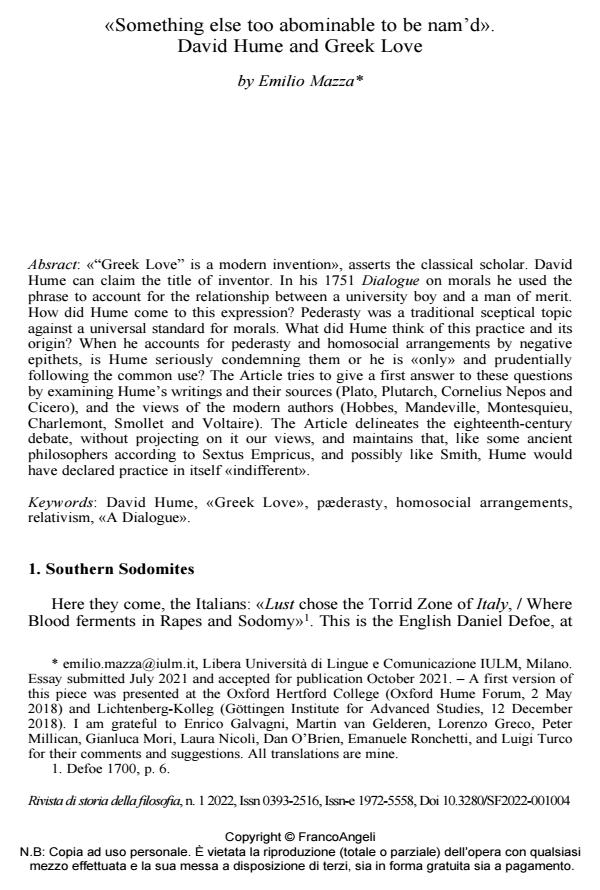«Something else too abominable to be nam’d». David Hume and Greek Love
Titolo Rivista RIVISTA DI STORIA DELLA FILOSOFIA
Autori/Curatori Emilio Mazza
Anno di pubblicazione 2022 Fascicolo 2022/1
Lingua Inglese Numero pagine 30 P. 51-80 Dimensione file 221 KB
DOI 10.3280/SF2022-001004
Il DOI è il codice a barre della proprietà intellettuale: per saperne di più
clicca qui
Qui sotto puoi vedere in anteprima la prima pagina di questo articolo.
Se questo articolo ti interessa, lo puoi acquistare (e scaricare in formato pdf) seguendo le facili indicazioni per acquistare il download credit. Acquista Download Credits per scaricare questo Articolo in formato PDF

FrancoAngeli è membro della Publishers International Linking Association, Inc (PILA), associazione indipendente e non profit per facilitare (attraverso i servizi tecnologici implementati da CrossRef.org) l’accesso degli studiosi ai contenuti digitali nelle pubblicazioni professionali e scientifiche.
«Greek Love is a modern invention», asserts the classical scholar. David Hume can claim the title of inventor. In his 1751 Dialogue on morals he used the phrase to account for the relationship between a university boy and a man of merit. How did Hume come to this expression? Pederasty was a traditional sceptical topic against a universal standard for morals. What did Hume think of this practice and its origin? When he accounts for pederasty and homosocial arrangements by negative epithets, is Hume seriously condemning them or he is «only» and prudentially following the common use? The Article tries to give a first answer to these questions by examining Hume’s writings and their sources (Plato, Plutarch, Cornelius Nepos and Cicero), and the views of the modern authors (Hobbes, Mandeville, Montesquieu, Charlemont, Smollet and Voltaire). The Article delineates the eighteenth-century debate, without projecting on it our views, and maintains that, like some ancient philosophers according to Sextus Empricus, and possibly like Smith, Hume would have declared practice in itself «indifferent».
Parole chiave:David Hume, «Greek Love», pæderasty, homosocial arrangements, relativism, «A Dialogue»
Emilio Mazza, «Something else too abominable to be nam’d». David Hume and Greek Love in "RIVISTA DI STORIA DELLA FILOSOFIA" 1/2022, pp 51-80, DOI: 10.3280/SF2022-001004